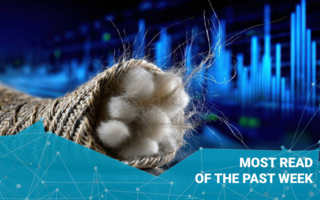17/03/2021 – 35th International Cotton Conference Bremen — auf Deutsch lesen
Keynotes: Sustainability, transparency and responsibility
Around 400 participants from over 30 countries have registered for the conference, which takes place on 17 and 18 March.
During the conference 80 experts from science and practice will contribute to the success of the virtual conference with inspiring lectures or by taking part in discussions.
The keynotes will be hosted by two cotton industry representatives with many years of experience in the trade: Bill Ballenden, founder and owner of Dragontree, UK, an online auction platform for the cotton trade, and Fritz A. Grobien, Vice President of the Bremen Cotton Exchange.
What about climate change?
On day one of the conference, Kai Hughes asks is “Climate change – a storm in a teacup?” Hughes is Managing Director of the International Cotton Advisory Committee, Washington D.C., USA. The aim of his presentation is to work out the challenges of climate change for agriculture, and especially cotton production. Building on this, concrete approaches and solutions should be discussed within the cotton community.
Supply chains – which strategy applies to sustainability?
Nanda Bergstein is Director of Sustainability at Tchibo GmbH, Hamburg, Germany. In her keynote, she presents the sustainability strategy of this family business which, through trading coffee and with a special sales concept, has developed into one of the largest German consumer goods and retail companies. In 2006, Tchibo decided to operate 100 percent sustainably. The company sees great opportunities for achieving its goal in building transparent supply chains.
Sustainability and corporate governance
The starting signal for the second day of the conference is a keynote by Heinz Zeller, Head of Sustainability & Logistics at Hugo Boss. Hugo Boss AG, Metzingen, Germany, is the producer and distributor of the world-famous, premium-segment lifestyle brand Hugo Boss. In his lecture, Heinz Zeller shows why cotton is still the most important raw material for Hugo Boss, but also addresses the specific challenge. Why is transparency still important, what experiences has the company had in the implementation process, and what role does the company’s Responsible Product Policy play in this?
The view from the financial sector
Michael Alt, Head of Commodities Advisory & Distribution, and Egon Weinberg, Head of Commodity Research at Commerzbank, Frankfurt, Germany, provide an overview of what drives commodity markets on the stock exchanges, and offer a special look at cotton. It should be made clear what effects market participants can expect and how they can operate predictive risk management in advance.
The keynotes at a glance:
Climate Change
Transparent Supply Chains with Tchibo
Sustainable Corporate Management at BOSS AG
The View from the Financial Sector: Cotton and Risk Management
Diversity in science and practice
The International Cotton Conference programme is impressive in its diversity, with 14 sessions. In the conceptual context, the major topics include sustainability, transparency, and responsibility along the cotton production and supply chains, as part of a resource-saving circular economy.
The technical part of the conference deals with methods to support progressive and resource-saving processes that lead to higher yields for farmers, and a better quality of cotton in terms of its further processing into textiles. This clearly shows that the use of cotton goes far beyond the clothing sector, and that natural fibres can be used for technical applications, as well as in a modified form as a plastic substitute.
Parallel to the sessions, poster presentations and expert sessions will take place on the conference platform, some of which will follow on from the lectures or provide informative impulses to open the view to other subject areas in different ways. There will be a special ‘room’ for this on the virtual conference platform, which is open for communication between the participants.
The conference homepage provides more detailed information on the programme and its events.
Communication and interaction are also possible virtually
Interaction and exchange among the participants are of great importance, both during and after the conference. The conference platform’s interaction tools make it possible to ask questions to the speakers or take part in surveys during the presentations. Participants and speakers can arrange private video meetings after the presentations.
Other dialogue formats that help people get into conversation are offered as part of digital matchmaking on selected topics, or as business speed dating to get to know each other. If necessary, every participant can be reached via the conference platform. More on this here.




